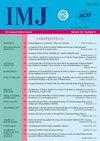LIFE QUALITY OF PATIENTS WITH NEWLY DIAGNOSED PULMONARY TUBERCULOSIS WHEN USING ALCOHOL
Q4 Medicine
引用次数: 0
Abstract
Interest to the studies of life quality by scientists and practitioners is constantly growing, as this unique approach allows to fundamentally change the traditional view of the problem of the disease and the patient. By investigating the quality of life as an integral index of the patient's condition, it is possible to assess the complex impact of the disease on the patient's life, to compare the effectiveness of various interventions, to predict the disease course. However, the problem of assessing the quality of life in patients with tuberculosis under conditions of alcohol consumption remains poorly understood. To establish the level of quality of life in patients, 102 men with newly diagnosed tuberculosis, with preserved sensitivity to anti−tuberculosis drugs were examined. The AUDIT test was used to assess their alcohol consumption, and the MOS SF−36 questionnaire was used to analyze the quality of life parameters. The study also assessed quality of life parameters and alcohol consumption in groups with varying prevalence of tuberculosis and the presence of mycobacteria or no bacterial excretion. According to the findings, the following conclusions can be drawn: pulmonary tuberculosis leads to a decrease in quality of life with the greatest depression in the group of patients who abuse alcohol; quality of life indices are significantly lower in patients with advanced tuberculosis and bacterial excretion, while the level of alcohol consumption in these groups is significantly higher than in patients with localized forms and lack of bacterial excretion. Interestingly, when interviewing patients, none of them rated their health as "excellent", answering the first question of the SF−36 questionnaire, and 100 % of respondents to question 11 answered "definitely not" to the statement "I expect my health to deteriorate". The obtained research data on the parameters of quality of life in patients with tuberculosis can be used to achieve the highest effectiveness of therapy and targeted psychosocial rehabilitation. Key words: tuberculosis, alcohol, quality of life, bacterial excretion.新诊断肺结核患者饮酒后的生活质量
科学家和从业者对生活质量研究的兴趣不断增长,因为这种独特的方法可以从根本上改变人们对疾病和患者问题的传统看法。通过将生活质量作为患者病情的一个整体指标进行调查,可以评估疾病对患者生活的复杂影响,比较各种干预措施的有效性,预测病程。然而,在饮酒条件下评估肺结核患者生活质量的问题仍然知之甚少。为了确定患者的生活质量水平,对102名对抗结核药物保持敏感性的新诊断肺结核患者进行了检查。AUDIT测试用于评估他们的饮酒量,MOS SF−36问卷用于分析生活质量参数。该研究还评估了肺结核患病率不同、有分枝杆菌或无细菌排泄的人群的生活质量参数和饮酒量。根据研究结果,可以得出以下结论:在酗酒患者中,肺结核导致生活质量下降,抑郁程度最高;晚期肺结核和细菌排泄患者的生活质量指数明显较低,而这些组的饮酒水平明显高于局限性肺结核和缺乏细菌排泄的患者。有趣的是,在采访患者时,他们中没有一人将自己的健康状况评为“优秀”,回答了SF−36问卷的第一个问题,而第11个问题的100%受访者对“我预计我的健康状况会恶化”的说法回答“肯定不会”。所获得的关于结核病患者生活质量参数的研究数据可用于实现最高疗效的治疗和有针对性的心理社会康复。关键词:肺结核,酒精,生活质量,细菌排泄。
本文章由计算机程序翻译,如有差异,请以英文原文为准。
求助全文
约1分钟内获得全文
求助全文
来源期刊

International Medical Journal
医学-医学:内科
自引率
0.00%
发文量
21
审稿时长
4-8 weeks
期刊介绍:
The International Medical Journal is intended to provide a multidisciplinary forum for the exchange of ideas and information among professionals concerned with medicine and related disciplines in the world. It is recognized that many other disciplines have an important contribution to make in furthering knowledge of the physical life and mental life and the Editors welcome relevant contributions from them.
The Editors and Publishers wish to encourage a dialogue among the experts from different countries whose diverse cultures afford interesting and challenging alternatives to existing theories and practices. Priority will therefore be given to articles which are oriented to an international perspective. The journal will publish reviews of high quality on contemporary issues, significant clinical studies, and conceptual contributions, as well as serve in the rapid dissemination of important and relevant research findings.
The International Medical Journal (IMJ) was first established in 1994.
 求助内容:
求助内容: 应助结果提醒方式:
应助结果提醒方式:


